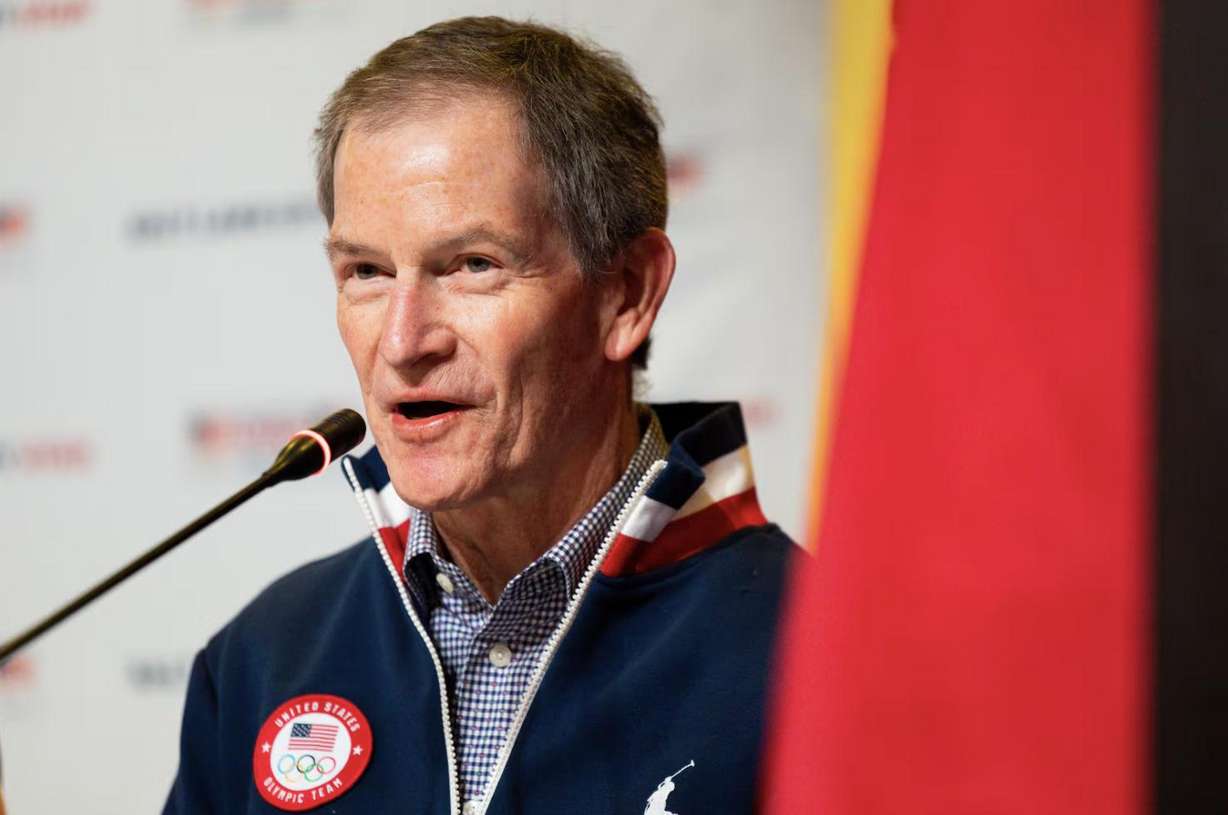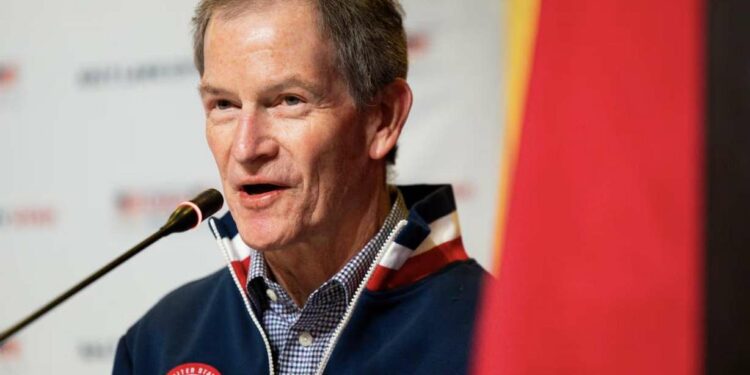SALT LAKE CITY — Utahns don’t need to worry about losing the 2034 Winter Games over a last-minute contract change, according to a top U.S. Olympic official
That’s the message in a new letter to members of the Salt Lake City-Utah Committee for the Games, sought by committee leaders to explain the issue that led to the addition of a new termination clause in the International Olympic Committee’s hosting contract, the U.S. response to Chinese swimmers who tested positive for a banned substance in 2021.
Utah’s Olympic organizers were “pulled into this dispute even though it has nothing to do with us,” the committee’s president and CEO, Fraser Bullock, said. “We asked the (U.S. Olympic and Paralympic Committee) to clarify this dispute for our board, and they prepared this letter.”
Ongoing friction between the U.S. and international anti-doping agencies flared up shortly before the International Olympic Committee’s scheduled July 24 vote on Utah’s bid to host the 2034 Winter Games, raising the possibility that the long-awaited decision would be delayed.
What sparked the behind-the-scenes drama was the U.S. government subpoenaing an international swimming official in Switzerland despite the Canadian-based World Anti Doping Agency choosing not to challenge China’s assertion that the positive test results were due to inadvertent exposure to a heart medication.
To calm outraged international sports officials, Utah bidders and the (U.S. Olympic and Paralympic Committee) agreed to add language that allows the IOC to take back the Games if “the supreme authority of the World Anti Doping Agency in the fight against doping is not fully respected or if the application of the World Anti-Doping Code is hindered or undermined” by the United States.
The clause has been dubbed “blackmail” by some, but the U.S. Olympic and Paralympic Committee letter says otherwise.
“We assure you that the additional language added to the hosting contract will not impact Utah’s capability to be an exceptional host. There is no cause for concern regarding its implications,” states the page-long letter written by the U.S. Olympic and Paralympic Committee president and board chairman, Gene Sykes.
 Gene Sykes, U.S. Olympic and Paralympic Committee board chair, speaks at a press conference with the International Olympic Committee’s Future Host Commission, IOC and U.S. Olympic & Paralympic leaders during their visit to Salt Lake City to tour proposed venues for the 2034 Games at Edison House in Salt Lake City on April 13. (Photo: Megan Nielsen, Deseret News)
Gene Sykes, U.S. Olympic and Paralympic Committee board chair, speaks at a press conference with the International Olympic Committee’s Future Host Commission, IOC and U.S. Olympic & Paralympic leaders during their visit to Salt Lake City to tour proposed venues for the 2034 Games at Edison House in Salt Lake City on April 13. (Photo: Megan Nielsen, Deseret News)
Using some of the same language as he did in an interview last month with the Deseret News, Sykes writes that the addition to the contract “does not impose any new or unmanageable obligations on either the (U.S. Olympic and Paralympic Committee)” or Utah’s Olympic organizers and “aligns with our existing commitments” to support the World Anti-Doping Code.
His letter states that “(c)laims suggesting that added language in respect of anti-doping constitutes coercion are unfounded,” and that the “intent behind this revision was to alleviate any apprehensions by reaffirming our dedication to the global anti-doping framework, not to introduce additional requirements.”
The contract already could be terminated for “events such as war or a lack of good standing with the World Anti-Doping Code,” Skyes point out, adding that the U.S. Olympic and Paralympic Committee does not change any laws, including the controversial act passed in 2020 that empowers the U.S. Justice Department to deal with international doping issues when American athletes are competing.
His letter, which a U.S. Olympic and Paralympic Committee spokesman said speaks for itself, also addresses the Chinese swimmer issue specifically.
“Supporting (World Anti Doping Agency’s) role in the international anti-doping community does NOT mean we support the Chinese athletes over (the U.S. Anti Doping Agency). Nor does it mean we feel (World Anti Doping Agency) has done everything right in this case. The (U.S. Olympic and Paralympic Committee), and others, have questions about what happened and how the situation was managed, and we will continue to pursue answers to these.”
Sykes, recently named an IOC member, makes it clear that the U.S. Olympic and Paralympic Committee is taking the lead on resolving the issue, noting it is “unrelated” to Utah.
“The (U.S. Olympic and Paralympic Committee) is actively engaged in resolving the ongoing tensions between (World Anti Doping Agency) and (U.S. Anti Doping Agency) through constructive dialogue. I am confident that with time, patience, and innovative thinking, we can bridge the gaps between these organizations for the benefit of everyone involved,” his letter states.
In the two additional pages of answers to what Sykes termed frequently asked questions about the issue, he spells out that Utah’s “role is to cooperate with the international community to make the 2034 Games clean and safe for the world’s athletes,” through overseeing the “implementation of the Games anti-doping testing program, with adherence to the global structure set by the IOC.”
Bullock said Utah organizers are not involved in the ongoing discussions.
“This ongoing anti-doping dispute is the (U.S. Olympic and Paralympic Committee’s) issue to work through, and we appreciate their efforts in doing so,” the Utah Olympic leader said, adding, “We agree with the content of the letter, and we support the (U.S. Olympic and Paralympic Committee) in these important efforts.”
Source link : http://www.bing.com/news/apiclick.aspx?ref=FexRss&aid=&tid=66da2be79ed84ccab9492d36bb86f977&url=https%3A%2F%2Fwww.ksl.com%2Farticle%2F51118541%2Fwhy-an-olympic-leader-says-utah-shouldnt-be-concerned-about-losing-the-2034-winter-games-&c=9040512833905168864&mkt=en-us
Author :
Publish date : 2024-09-05 07:02:00
Copyright for syndicated content belongs to the linked Source.





